Tan Dun: Marco Polo
Introduction
This recording of Tan Dun's 'opera within an opera' was made twelve years after the premiere in Munich, which itself was performed four years before the composer became known worldwide after writing the Oscar-winning score for Crouching Tiger, Hidden Dragon.
The story, such as it is, reflects the physical and spiritual travels of the great 13th century Venetian trader/explorer, who was the first to write about the experiences of journeying along the Silk Road to the Far East. It also reflects the physical, spiritual and musical experiences of the composer himself, as he 'travelled' from Eastern to Western culture, mixing everything up in between. It also reflects the travels we have all taken within ourselves, mixing memories from the past (not only our own) with some sort of future echoes.
So, not really the typical plot one would expect, or perhaps hope for from a musical work with such a title, but it's one which reaps some rewards, although as a viewer and listener, you have to work had to get them sometimes.
Audio
The DTS track is spectacular, and probably damaged my bass speaker as didn't expect the amount of bass drumming which permeates the work. Once a more sensible level is achieved, the colours of the huge orchestra, plus instrumentation from the various countries involved in Polo's travels are brought vividly to life, and there's little problem with balance between these sounds and the stage.
It's advisable to use subtitles though, not because the DVD states 'Sung mostly in English', but because the vocal writing breaks up the text in a way that makes things very difficult to hear.
Video
Perfectly clear, and there is no trouble with the darker scenes, of which there are many.
Extras
The synopsis is probably the thing to aim for first, only to give you an idea as to what is actually going on. It may or may not help, but at least it introduces the characters.
The main extra consists of a 25 minute film, 'The Music of Tomorrow', which is basically a behind the scenes look at the creation of this production. Ideally, it could have been much longer, probably making this into a 2-disc set, but it is a valuable insight into the creation process of such a work, and I wish I had watched it first.
There is also an essay by Reiner E. Moritz within the accompanying booklet, which helps in some way to understand the opera, but when you read a phrase such as 'Did Marco Polo's journey actually happen? Did someone dream it up. Or did the journey imagine us?' , you have to start taking things with a little more than a pinch of salt.
Conclusion
As I mentioned at the beginning, Tan Dun is probably most famous for his Crouching Tiger, Hidden Dragon score. In 1997, he wrote a work for the ceremony for the Hong Kong sovereignty transferral, and most recently, wrote the 'Internet Symphony No.1', performed by (the distinctly average) YouTube Symphony Orchestra in Carnegie Hall this year.
If you have heard any of this music, and you expect more of the same from Marco Polo, then you are either going to be severely disappointed, or will undergo some form of epiphany.
Here, Tan Dun has thrown almost all of his musical experiences into one big, very meaty pie. Medieval music, styles from India, Mongolia, the Middle East and China are mixed in with large chunks of actual quotes from Mahler and Cage-like prepared pianos. Specifically, the vocal techniques are just as varied, with classically-oriented throat singing, 1960s European shouting and ripping apart words into sounds that are just about the syllables into which those words are made up...and Chinese opera styles of which I know nothing about.
It is indeed a rich mix, and only succeeds through the efforts of the performers, both on stage, and down below, directed by the composer himself.
The star of the show is almost certainly Zhang Yun, who plays the dual character of Rustichello and The Questioner (Rustichello being the cell-mate of Polo while he was in prison towards the end of the 13th century). He appears as some sort of Harlequin / Passe-Partout character, with vocal techniques and acrobatic skills second to none. The fact that his English isn't that good (as he freely admits in the accompanying film) is one of the reasons you really need the subtitles, but he throws himself to the role like a man possesed, and his experience in Chinese opera shows in every movement, sound and facial expression he makes.
Marco Polo himself is played by two singers. 'Marco' (Sarah Castle) is the real-time/physical manifestation of the character, whilst 'Polo' (Charles Workman), is the memory of everything he has experienced. The two often act as if they are almost violently opposed to each other, with 'Water' (Nancy Allen Lundy - seen in the attached YouTube video) being a calming influence, and seemingly a 'lover' to Polo.
All three are excellent, although Workman shows some strain towards the end, which isn't really surprising considering the extremes of the vocal lines.
Stephen Bryant excels as 'Dante' (as well as Shakespeare and Shadow 3), the imaginary character who seems to see doom and gloom everywhere, and Mu Na is exceptional as the wordless Chinese/Arabian dancer. If her appearance in the documentary is anything to go by, I could have quite happily watched her in a lot more of the actual opera.
This is not the Tan Dun with which people may be familiar, but it is a fascinating, if not always successful journey through a variety of musical styles. If I were to be at my most cynical, I would say that it was a load of pretentious tosh, yet if it was really so, then it's doubtful Pierre Audi and the Netherlands opera would have bothered with putting on what was bound to have been a very expensive production.
So, I'm quite prepared to admit I didn't actually understand everything that was going on, from the basic outlay of the plot, to why, precisely, characters such as Shakespeare, Scheherazade and Mahler appeared. I'm also prepared to claim that, apart from the concept of the story, there is little new here, musically at least.
Mixing Western and Eastern musical ideas has been a staple diet of composers for over 100 years before Tan Dun 'came up' with the idea, and so we need to look for something more to recommend this.
This is a fine DVD production, but apart from the individual performances I've already mentioned, and the splendid set, costumes and lighting, I was left rather cold.
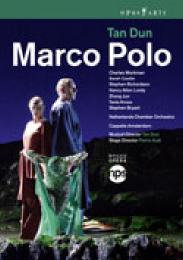
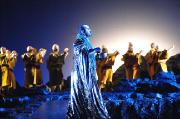
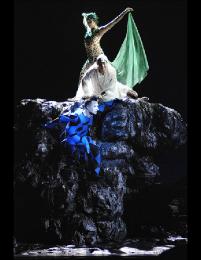
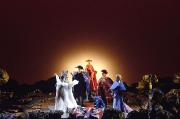
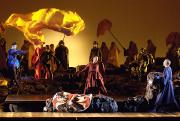
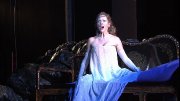
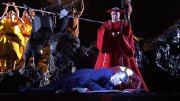
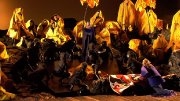
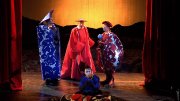
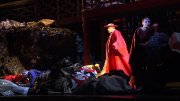



































Your Opinions and Comments
Be the first to post a comment!